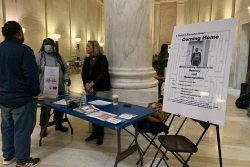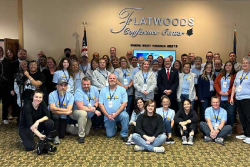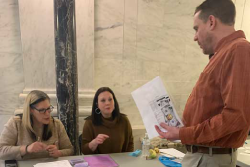The journey through justice system involvement, recovery from substance use disorder and workforce re-entry is longer and more complex than most realize. Investing in partners, such as The REACH Initiative in Charleston, West Virginia, that make this process easier for Appalachians is a key part of our Investments Supporting Partnerships in Recovery Ecosystems Initiative (INSPIRE).
“We often believe when someone graduates from a recovery program, they are ready to return to the community and navigate life on their own,” said Beverly Sharp, executive director of The REACH Initiative. “Everyone in recovery is in some stage of re-entry, trying to navigate barriers. We lose too many people within the first few weeks after re-entering their communities because they have little to no supportive wrap around services to help them navigate those barriers.”
Offering Personalized Support
Using their nearly $481,000 INSPIRE grant, The REACH Initiative will hire a cohort of “REACHback” recovery/re-entry navigators, who will be trained to provide personalized support to justice-involved individuals in recovery. This type of support is key to a successful recovery-to-work ecosystem, which promotes access to support services and training that help people in recovery find and keep quality employment.
Navigators will not only consider clinical needs related to substance use disorder treatment, but also social, emotional and environmental factors, Sharp said. A wrap-around service plan could include:
- Mental health services
- Education access
- Job skills training
- Career planning
- Housing support
- Community integration assistance
Wrap-around plans are of particular importance in rural Appalachia, where distance, isolation and persistent economic distress contribute to unmet needs for services. REACHback plans to support participants across Boone, Jackson, Kanawha, Lincoln, Logan, McDowell and Mingo counties.
Partnering for Success
To best meet participants’ recovery-to-work needs, REACHback will collaborate with a variety of educational, nonprofit and business partners. Marshall University’s CORE program will offer job placement assistance through career readiness assessment, job search skills training, education and placement. Additionally, Appalachian Botanicals, Charleston Property Restoration, Coalfield Development and Facing Hunger Foodbank are committed to hiring REACHback participants and providing on-the-job training.



REACHback is also intentional about its duration – participants are eligible for one year of services; many programs offer less than half that. By the end of their project period, they expect to serve 830 workers and trainees, and improve 70 businesses and 15 communities.
“If we want to save lives, if we want justice-involved people to be successful at re-entering their community, if we want to increase the workforce participation rate in our state, we must create a viable recovery-to work ecosystem,” said Sharp.
Learn more about the $11.5 million INSPIRE package announced on September 18, 2024 at the Land of Sky office in Asheville, North Carolina. The package supports 39 recovery-to-work projects in communities across nine Appalachian states.